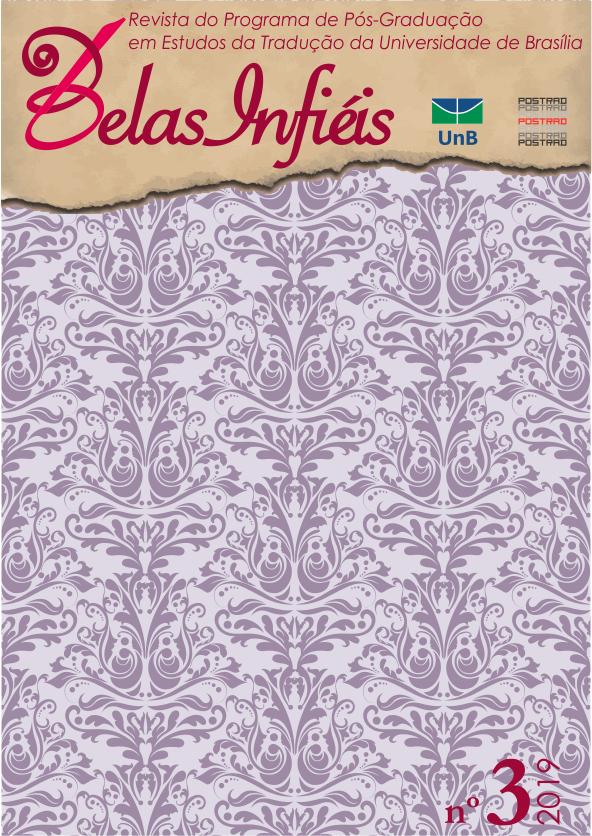Wabi Sabi: Intermediated Textures of Impermanence and Imperfection
DOI:
https://doi.org/10.26512/belasinfieis.v8.n3.2019.26340Palabras clave:
Intermediation. Transculturality. Translation. Wabi Sabi. Children’s Literature.Resumen
Mark Reibstein and Ed Young’s 2008 picture book Wabi Sabi tells the story of a Kyoto cat in search of the meaning of its name. This award-wining children’s book explores identity through the composition of various layers of meaning and complexity in form and structure, suggesting that an understanding of identity cannot be expressed easily through words alone. This paper begins by examining how the use of a range of storytelling modes including collage, photography, drawing, poetry and prose are combined, inviting the implied child reader to become involved in the intermedial qualities of the text, at the same time as they follow the cat in its journey of self-discovery. Focus then turns to the use of natural, textured materials in the artwork of the picture book, analyzed as a reflection of the concept of wabi sabi; a Zen-Taoist philosophy that draws attention to the value and beauty of impermanence and imperfection. This alternative way of thinking about identity proposes that self-knowledge is attained through an encounter with simple, rustic and natural phenomena, as opposed to the industrialized newness and perfection so often idealized in Western civilization. The third section of the paper explores how the text, with its capacity to incorporate both Western and Japanese modes of storytelling, is a form of cultural translation. Not confined to the traditional mode of translation from one language to another, or from source to target text, this picture book, in its use of haiku and Japanese calligraphy, its glossary and its explanation of wabi sabi, invites the reader to consider how translation shares ideas across and between time and cultural context.
Descargas
Citas
BASSNETT, Susan. Translation Studies. 4 ed. Routledge, 2014.
BHABHA, Homi K. The Location of Culture. 2 ed. Routledge, 2004.
CONWAY, Kyle. Cultural Translation. In: GAMBIER, Yves (ed.); DOORSLAER, Luc van (ed.). Handbook of Translation Studies. v. 3. Amsterdam: John Benjamin Publishing Company, 2012. p. 21-25.
FEATHERSTONE, Mike. Global Culture: Nationalism, Globalization and Modernity. Sage, 1990.
HAKUTANI, Yoshinobu. Haiku and Modernist Poetics. Palgrave MacMillan, 2009.
HERZOGENRATH, Bernd. Travel in Intermediality, An Introduction. In: HERZOGENRATH, Bernd (ed.). Travels in Intermedia(lity): Reblurring the Boundaries. Darmouth College Press, 2012. p.1-14.
JUNIPER, Andrew. Wabi Sabi: the Japanese Art of Impermanence. Tuttle Publishing, 2011.
KAWAMOTO, Koji. The Use and Disuse of Tradition in BashÅ's Haiku and Imagist Poetry. Poetics Today, Durham, NC, v. 20, n. 4, p. 709-721, winter, 1999.
KLINGBERG, Götte. Children’s Fiction in the Hands of the Translators. Liber/Gleerup, 1986.
PYM, Anthony. Exploring Translation Theories. Routledge, 2014.
REIBSTEIN, Mark; YOUNG, Ed. Wabi Sabi. Little Brown and Company, 2008.
SHAVIT, Zohar. Poetics of Children’s Literature. University of Georgia Press, 1986.
YASUDA, Kenneth. Japanese Haiku: Its Essential Nature and History. Tuttle Publishing, 2011.
Descargas
Publicado
Cómo citar
Número
Sección
Licencia
Copyright Statement
Given the public access to this journal, the texts are free to use but requires the recognition of the original authorship and initial publication in this journal to be properly stated.
The journal allows the use of works published for non-commercial purposes, including the right to submit the work to publicly accessible databases. Published contributions are the sole and exclusive responsibility of the author(s).
- When submitting papers to be evaluated by the Belas Infiéis journal, the author(s):
- Declare that the contents of the contributions are original and of their original creation, being entirely responsible for their content if there is an objection by third parties.
- Claim to be aware that they should not commit academic plagiarism.
- Declare that the manuscript has not been published, completely or partially, in Portuguese or another language. If it is a translation it should be submitted to the Translated Articles section.
- Declare that the manuscript is not being evaluated by other journals.
- Declare that the manuscript was not submitted to another journal simultaneously.
- Commit(s) to inform the journal of any kind of error or inaccuracy in their contribution (published, in evaluation or in editing) and to collaborate with the editors to make due corrections of the article (when in evaluation or editing) or erratum/retraction (after publication).
- Declare that there is no conflict of interest regarding the published work.
- Authorize its release if it is accepted for publication without any kind of monetary compensation.
- Agree to assign non-exclusive rights to publication to the magazine, remaining free to make their contribution available in other media as long as the publication of the first version in Belas Infiéis magazine is mentioned. They also authorize Belas Infiéis to assign their texts for reproduction in content indexers, virtual libraries and similar platforms.
- Maintain copyright and grant the journal the right of first publication, the work being licensed under theCreative Commons Attribution License.
- Is/Are allowed and encouraged to publish and distribute their work online after the editorial process, which may increase the impact and citation of the published work.
- Authorize the editorial team to make textual adjustments and to adapt the article to the publication rules, when necessary.



















